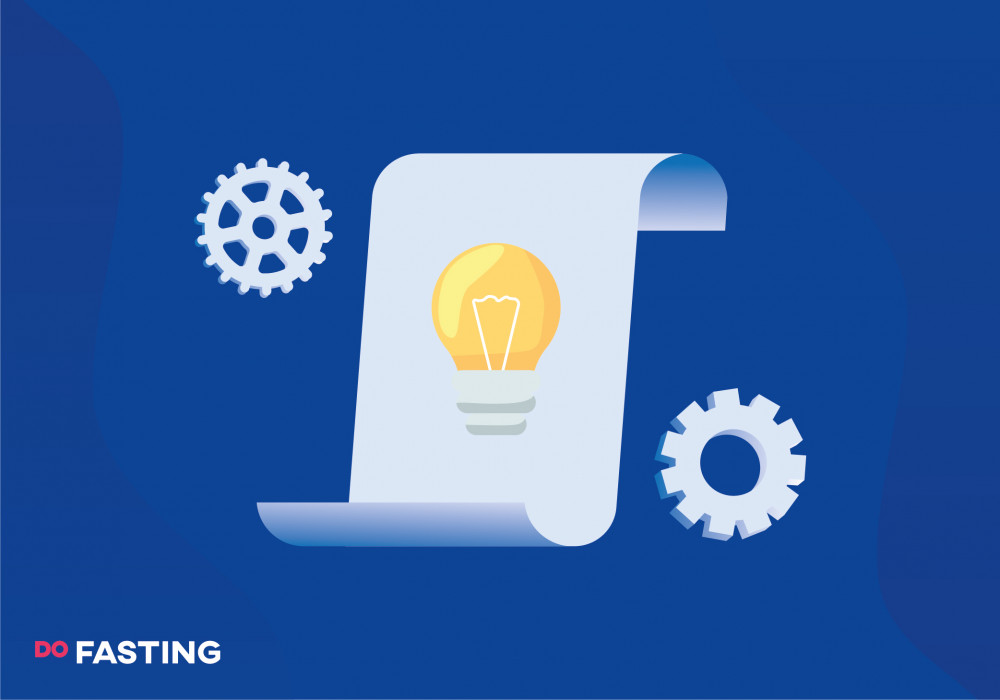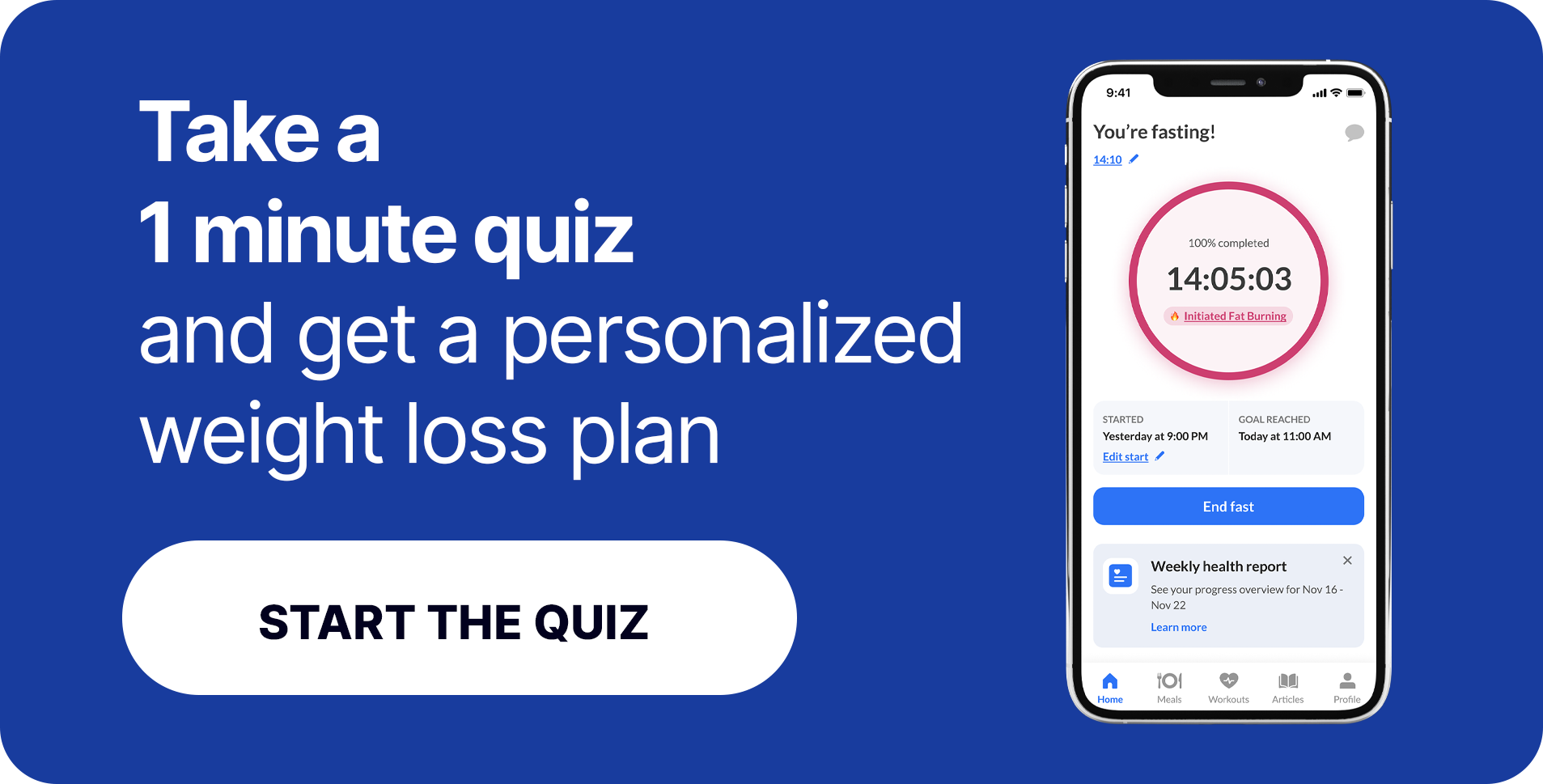What Is Water Fasting and How Safe It Is

Water fasting is a great way to lose plenty of weight in a short amount of time. However, since you’re only allowed to consume water, it’s an advanced form of intermittent fasting.
Water fasting has many health benefits, including reducing high blood pressure and protecting against heart disease, helping to shed body fat, and increasing longevity but it also comes with some health risks and isn’t suitable for everybody to try.
- What is water fasting?
- How to start water fasting
- What are the benefits of doing water fasting?
- 3 simple tips on how to successfully do water fasting
- What are the drawbacks of doing water fasting?
- Who should not fast?
- Frequently asked questions
What Is Water Fasting?
Water fasting is a method of intermittent fasting where you can only drink water and nothing else, whether it’s food or beverages.
It’s an intermediate form of fasting, and we recommend starting out with more beginner-friendly forms of IF first.
16:8 is a great way to start your intermittent fasting journey and get a feel for what it’s like to use a time-restricted eating pattern.
Water fasting can be used as part of a healthy diet to lose weight and usually lasts between 24 and 72 hours. Any longer and medical supervision is required for water fasting.
Water fasting is generally used to lose weight, but there are other reasons a person may restrict food intake and only drink water for an extended period of time.
These reasons could include detoxifying the body, for religious or spiritual reasons, and in preparation for a medical procedure under medical supervision.
There are many health benefits of water fasting but it also comes with many health risks and may not be suitable for a range of people, including those who have a history of eating disorders and pregnant women.
How to Start Water Fasting
Water fasting is all about preparation and planning. Here are three steps that will help you get going.
-
A few days before starting water fast, reduce the number of consumed calories
When you decide to water fast, you need to prepare your body in advance. This means reducing your caloric intake in the days running up to water fast or fasting for longer periods of time if you are following a schedule of intermittent fasting.
Changing your eating habits and reducing your caloric intake in the days preceding a fast can help your body adjust to reduced caloric intake and may help to reduce any negative side effects caused by fasting.
-
Consume more water than you normally would
During a water fast, it is very important that you drink enough water to remain hydrated. You should aim to drink around two to three liters of water each day of your fast.
Maintaining your fluid and electrolyte levels during a water fast is essential for you to retain normal kidney function and maintain overall health during the fasting period.
-
Break the water fast with a small meal
Once you have completed your fast, you need to ensure that you break it with an appropriate meal. You should plan this meal in advance of the fast.
Even though you will likely want to eat a large meal after prolonged fasting, you should ease your digestive system back into digesting food by only eating small meals.
Smoothies, soups, and other small meals are suitable as you build your body back up to its normal feeding level.
The amount of time it takes you to return to normal eating depends on the length of your fast. If you fasted for three days, you should return to proper eating over the course of three days too.
Breaking your fast with a meal that is too large may lead to an upset stomach and could trigger binge eating which could reverse any weight loss and lead to other health complications.
What Are the Benefits of Doing Water Fasting?
There is a number of health benefits to doing a water fast and we have summarized them below for you.
Water fasting may promote autophagy
Autophagy is a natural process in our bodies in which cells are destroyed, removed, and recycled to make way for newer and healthier cells.
Autophagy is important for good health and has a number of benefits, including protection from certain cancers, prevention of some liver conditions, healthy aging, and increased longevity.
Fasting for long periods puts the cells in the body under stress which triggers autophagy.
Another health benefit is the reduction of inflammation
Reduced inflammation in the body is also a health benefit of water fasting.
Inflammation is the body’s natural response to pain and injury but chronic inflammation can be bad for the body and is linked to a number of chronic diseases, including arthritis.
Water fasting is thought to help reduce inflammation in the body while not interfering with the immune system's natural inflammatory responses.
Weight loss can also be tributed to water fasting
Water fasting is frequently used to help you lose weight. Losing weight may help to manage a number of medical conditions, help with the management of chronic disease and help with disease prevention.
Weight loss from a water fast is triggered in a number of ways.
Firstly, water fasts significantly reduce how many calories you consume for an extended period of time. This calorie deficit helps the body to reduce weight by burning more calories than it takes in.
Secondly, fasting is a known method of boosting metabolism which can speed up and improve digestion supporting healthy weight loss.
Lastly, extended periods of fasting force the body into a metabolic state called ketosis. Ketosis pushes the body to burn fat in place of blood sugar as fuel, helping to reduce body fat and stimulate weight loss.
It is possible on a water fast to lose up to 2 pounds a day.
It may also help lower blood pressure
Water fasts are thought to help reduce systolic blood pressure.
High blood pressure is commonly linked to poor heart health and is one of many cardiovascular risk factors. Reducing blood pressure may protect the body from certain heart conditions, like heart disease.
3 Simple Tips on How to Successfully Do Water Fasting
Now we are aware of all of the health benefits and weight loss benefits of water fasting, let's find out how to successfully complete a water fast.
Get a fasting app to track your fast and water intake
Tracking your fasting periods as well as your water intake is a good way to keep on track during water fasting.
The DoFasting app can help you to do just this, as well as provide some fantastic recipes to try post-fast and offer you workouts for both fasting and eating periods.
Keeping track of when you should and shouldn't be fasting can help you maintain your schedule easily.
Start water fast only when completely comfortable with 24 hours fast
Building up to a fast is integral for success. If you have never tried any kind of intermittent fasting before, it is important you do so.
There are a number of less challenging intermittent fasting types, including the 12:12 fast, the 16:8 fast, and alternate-day fasting, which can get your body more prepared for a long period of water fasting.
Stop the fast if you feel unwell
If you ever feel unwell during a water fast you should stop immediately.
There are many side effects and health concerns that can happen when you water fast and so you need to keep an eye on how you feel throughout.
Low blood sugar is a risk of water fasting, which can make you feel faint. If you feel faint, immediately stop your water fast.
What Are the Drawbacks of Doing Water Fasting?
Most types of diet plan come with some health risks and side effects. We have summarised these below for you to see.
Binge eating may be common after doing the fast
Due to prolonged fasting, you may be more likely to binge eat after days without food.
Though it is important you eat after fasting, your food intake must increase slowly over a few days to avoid shocking your digestive system or encouraging patterns of disordered eating.
Only eat larger meals and food that is harder to digest once you’re back to your normal eating patterns.
Another drawback is dehydration
Dehydration is a potentially fatal condition and so your water intake must be monitored. To be drinking at healthy levels, you need to consume between 2 - 3 liters of water each day of your fast.
Even though you still consume water during this fasting protocol, you also get 20 - 30% of your water each day from food, so water fasting may lead to a lack of adequate water when food is no longer consumed.
Malnutrition may also be caused by water fast
Nutrient deficiencies pose several risks and can be common in those who fast.
Ensure pre- and post-fast meals meet your nutritional needs and supplement throughout your water fasting period to keep nutrients at an optimal level.
Water fast may also cause orthostatic hypotension
Orthostatic hypotension is a drastic change in blood pressure between seated and standing positions.
If you already experience orthostatic hypotension, water fasting may not be for you.
Who Should Not Fast?
Though fasting is purported to improve health, there are some people who should not try it out. These people include
- People with medical conditions that will be exacerbated by fasting
- Pregnant and breastfeeding women
- Those with a history of eating disorders
- Anyone taking medications that need to be taken with food
If you would like to try out fasting but are concerned about how it will affect you, speak with your healthcare provider to find a safe way for you to try it.
Conclusion
Water fasting is a popular method of weight loss but may also be used for other health reasons, religious reasons, and medical reasons.
Research shows that this method of fasting can have a significant impact on your health, with reduced risk of heart disease and other cardiovascular diseases as well as increased autophagy as just a few of the health benefits.
There are some who should not try out fasting, including anyone with a health condition that would be exacerbated by fasting and anyone with a history of disordered eating.
There are some drawbacks to this fasting procedure but overall it is considered a healthy way to reduce body weight and improve health.
Frequently Asked Questions
-
How much weight can you expect to lose if you do a water fast for 3 days?
Scientific evidence suggests you can lose up to 2 pounds a day while water fasting. This means over three days you may lose up to 6 pounds. There is some debate as to how much weight is lost from fat and how much is lost in muscle mass, so water fasting should not be done too often.
-
Can water fast be a cause of water intoxication?
Water intoxication is a serious condition that can cause headaches, nausea, and vomiting. Drinking too much water too fast can cause it so during fasting, you need to spread your water consumption across the day. Drinking too much water too fast affects renal function and creates a drop in sodium levels, which causes these negative effects.
-
Can you die from doing water fasting?
There are some serious risks that come alongside water fasting, including dehydration and water intoxication, but if done properly, you should be safe. Be aware that this kind of fasting can exacerbate some medical conditions, like gout (due to an increase in uric acid production), and so it is not suitable for everyone.
